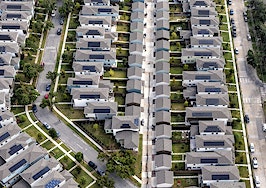Whether it’s refining your business model, mastering new technologies, or discovering strategies to capitalize on the next market surge, Inman Connect New York will prepare you to take bold steps forward. The Next Chapter is about to begin. Be part of it. Join us and thousands of real estate leaders Jan. 22-24, 2025.
A trade group representing mortgage bankers renewed its push for lower FHA mortgage insurance premiums Friday, following the publication of a report showing the Federal Housing Administration continues to build up its reserves against losses.
TAKE THE INMAN INTEL INDEX SURVEY FOR NOVEMBER
But private mortgage insurers are hoping to head off another FHA premium cut like the 35 percent reduction approved last year by the Biden administration that’s expected to save homebuyers billions. Former Trump administration Housing Secretary and Project 2025 author Ben Carson has even advocated raising FHA premiums.
In releasing its annual report to Congress Friday on the financial status of the FHA’s mortgage insurance program, the Department of Housing and Urban Development (HUD) said the FHA “maintains a very strong, well-capitalized insurance fund.”
The FHA Mutual Mortgage Insurance [MMI] fund — which dropped below its 2 percent statutory minimum from 2009 through 2014 and required a $1.69 billion taxpayer bailout — built up its reserves by $27.5 billion during the year ending Sept. 30, HUD reported.
At $172.8 billion, the MMI fund’s capital ratio grew to 11.47 percent — more than five times the statutory minimum, Mortgage Bankers Association President and CEO Bob Broeksmit noted in calling for another reduction in FHA premiums.

Bob Broeksmit
“While it is sensible to have a healthy cushion above the 2 percent minimum reserve, qualified borrowers should not be charged higher mortgage insurance premiums (MIP) than necessary,” Broeksmit said in a statement.
The MBA also repeated calls to end FHA “life of loan” requirements. Borrowers who take out private mortgage insurance are exempt from the requirement once they build up a 20 percent equity stake in their homes. FHA borrowers have to keep paying insurance premiums until they pay off their loans.
The National Association of Realtors, which welcomed the 2023 FHA premium cuts and supported ending FHA life of loan requirements, did not respond to Inman’s requests for comment Friday.
A trade group representing private mortgage insurers suggested that policymakers take a cautious approach to further FHA premium cuts to ensure that the program remains solvent in the event of another housing downturn.
“FHA plays an important countercyclical role in America’s housing finance system, and it must remain strong and well-capitalized in order to perform this critical function,” U.S. Mortgage Insurers President Seth Appleton said in a statement.

Seth Appleton
“While taxpayers stand behind 100 percent of the credit risk for FHA-insured mortgages, private capital stands in a first-loss position for low down payment loans backed by private mortgage insurance,” Appleton said. “As such, policymakers should ensure that there is a consistent, transparent, and coordinated approach to housing policy, so that private capital can protect against credit risk ahead of taxpayers whenever possible.”
The FHA program is supposed to be self-sustaining, with premiums collected from borrowers covering lender claims. In its report to Congress, HUD said another downturn like the 2007 subprime mortgage crisis wouldn’t require another bailout but would reduce the MMI fund’s capital ratio to 5.48 percent — still twice the statutory minimum.
“This suggests the MMI Fund is sufficiently capitalized to withstand a significant economic downturn,” HUD said.
However, the debate over where to set FHA premiums is also ideological.
Critics like Carson, who served as Trump’s Secretary of Housing from 2017 to 2021, say the government’s role in housing and housing finance should be more limited.
Carson’s chapter of Project 2025 calls for raising FHA insurance premiums, putting an end to HUD’s efforts to address appraisal bias and climate change issues, and eliminating the Housing Supply Fund, which provides grants to state and local governments to build more affordable housing.
Battle for market share
Private mortgage insurers compete with FHA and VA loan programs to serve homebuyers who can’t afford — or don’t want — to make a big down payment.
Fannie Mae and Freddie Mac require private mortgage insurance when homebuyers put less than 20 percent down.
During the 2007-2009 Great Recession, rising loan defaults and foreclosures generated a flood of claims that made it difficult for private mortgage insurers to write new policies.
As a result, private mortgage insurers saw their market share plummet from nearly 80 percent to less than 20 percent, according to data tracked by Inside Mortgage Finance and the Urban Institute.
FHA, VA and private mortgage insurer market share

The FHA MMI fund also took a massive hit, prompting the Obama administration to raise annual premiums on FHA loans from 50 basis points to 135 basis points from 2008 to 2013.
FHA premium increases helped private mortgage insurers retake some of the market share they’d lost during the housing crash. But private insurers lost some ground again when the FHA program recovered its footing, allowing for premium cuts in 2015 and 2023.
Last year’s premium cut made FHA mortgages more attractive than Fannie and Freddie mortgages with private mortgage insurance for most borrowers putting down less than 5 percent, analysts at the Urban Institute concluded.
The premium reductions will also save the nearly 1.2 million borrowers who have taken advantage of them an average of $453 a year, with projected savings of $5.1 billion over 10 years, HUD said in its annual report to Congress.
More than eight in 10 (82 percent) of the purchase mortgages backed by FHA in the last year were taken out by first-time homebuyers, HUD said. In 2023, FHA did more than twice as much business with Black borrowers (16.7 percent) and Hispanic borrowers (22.8 percent) as the rest of the market.

Julia Gordon
“Through our work, we have demonstrated that FHA can facilitate homeownership and wealth-building opportunities for hundreds of thousands of households and provide support for homeowners facing hardships while maintaining a financially sound Mutual Mortgage Insurance Fund,” FHA Commissioner Julia Gordon said in a statement.
FHA’s serious delinquency rate — the percentage of mortgages in its portfolio that are 90 or more days delinquent — was 4.15 percent as of Sept. 30, “consistent with rates prior to the onset of the COVID-19 pandemic,” HUD noted.
Mortgage delinquencies by loan type

But ICE Mortgage Technology’s Nov. 4 Mortgage Monitor report noted that delinquency rates on some types of loans have been rising due to factors including elevated interest rates, hurricanes, and slowly rising unemployment.
The largest increases have been among VA delinquencies (up 24 percent) and FHA (9 percent), ICE reported.
Delinquencies on loans backed by the “GSEs” — Fannie Mae and Freddie Mac — were effectively unchanged, while delinquencies on portfolio mortgages made by private lenders were down 3 percent from a year ago.
Get Inman’s Mortgage Brief Newsletter delivered right to your inbox. A weekly roundup of all the biggest news in the world of mortgages and closings delivered every Wednesday. Click here to subscribe.













